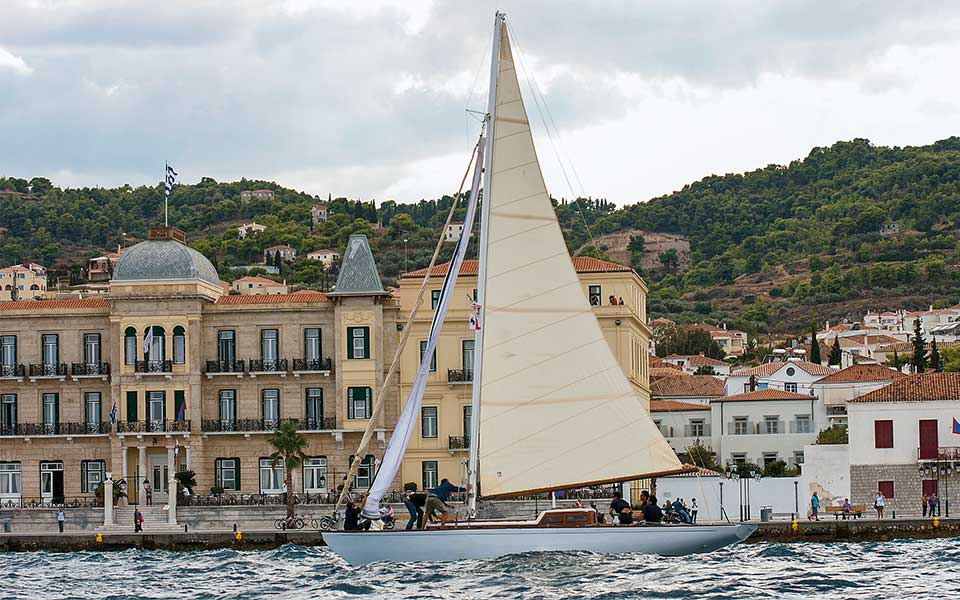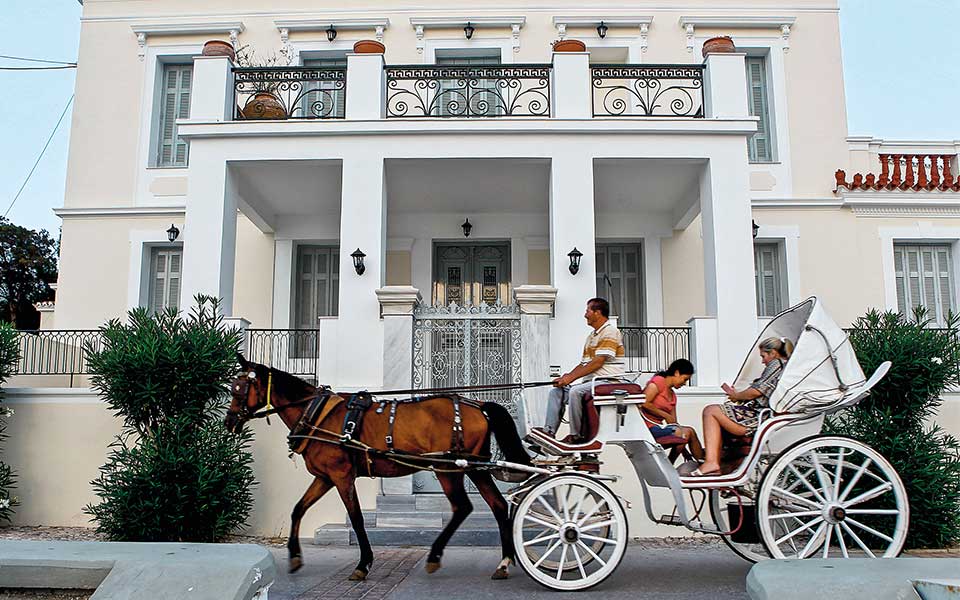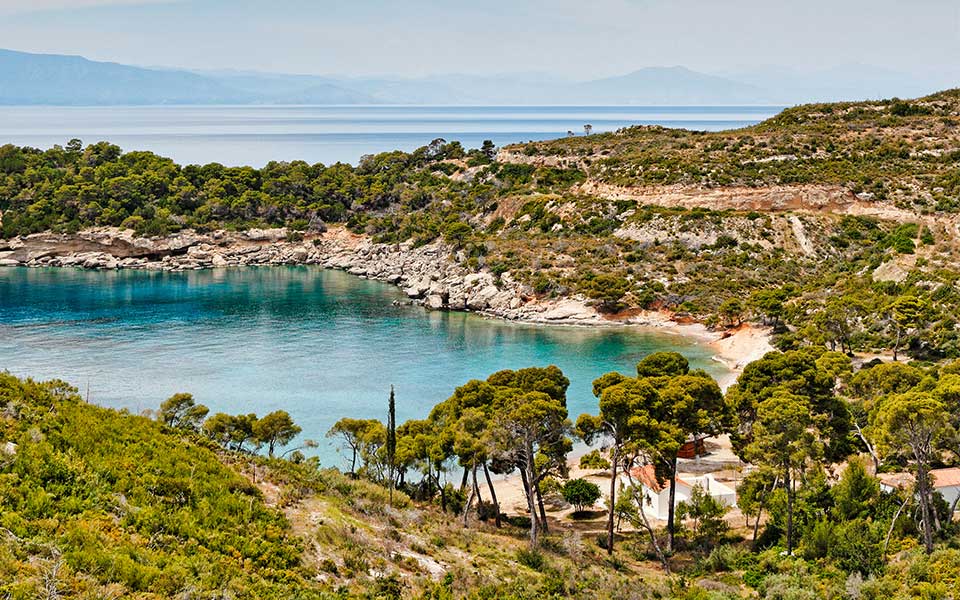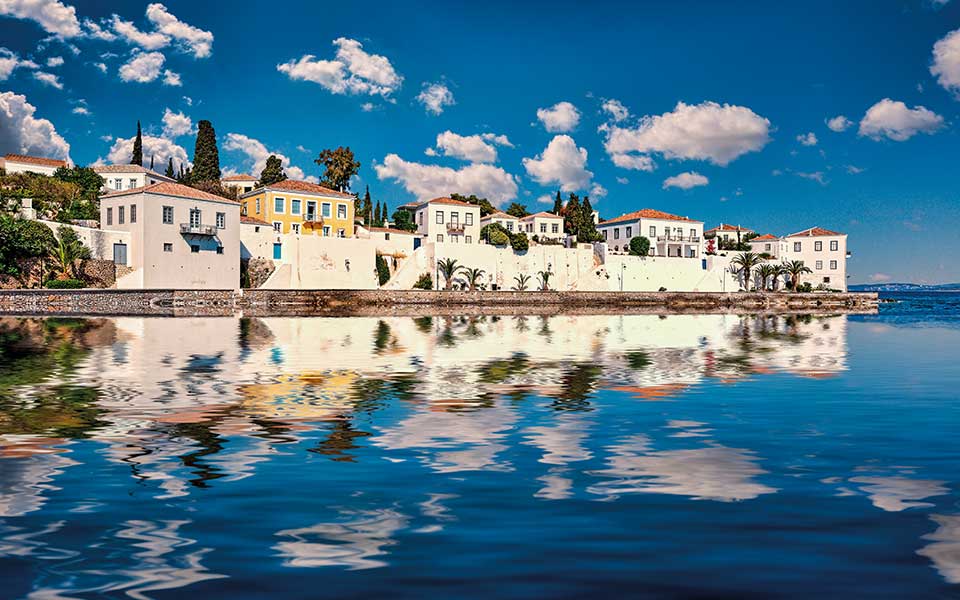First visited Spetses in late March, 1996, with a Japanese friend who was determined to set foot on a Greek island despite my warnings concerning the unseasonal timing.
It was a cold and overcast midweek morning when our water taxi dropped us off at Dapia, right in front of the then-derelict Poseidonion Hotel.
Having just read John Fowles’ “The Magus,” I had painted a mystical image of Spetses in my mind, a feeling that was only heightened by that first impression.
The sight of that beautiful but deeply damaged landmark hotel was my first brush with this cosmopolitan island, a beguiling yet also intensely surreal experience.
After all, imagine the reaction of the handful of locals going about their business at the sight of a Japanese and a Greek man, perhaps the island’s only visitors that day, landing at the port in what was effectively winter.
March is, obviously, not the best month to visit seaside or island destinations, Spetses included.
Today, the Poseidonion has been transformed from a ruin into a jewel of a landmark, thanks to an incredible restoration carried out by the Vordonis family.
On a summer evening, the veranda, with its old-world charm set against the island’s stunning beauty, brings to mind sophisticated seaside resorts on the French or Italian rivieras.

© Nikos Alevromitis/www.alen.gr
Spetses is a lot of different things. It’s the island of locals who run around like crazy all summer and while away the winters in abject boredom; it’s the tribes of – mostly Athenian – vacation homeowners; it’s the new arrivals, landing on its shores in every form of sea craft; it’s the day trippers coming over in water taxis or on the “slipper,” as the double-ended open ferry is known; it’s the handful of visitors who come here by private helicopter; and it’s a whole lot more.
All these different groups coexist on a well-kept historic island with pockets of incredible beauty and decent beaches with welcoming waters, especially on the side facing the open sea.
The most popular beaches for the younger crowd are Vrelos and Kaiki, the latter of which is not too far from the main town, in front of the Anargyreios and Korgialeneios College.
Literary fans should take the time to visit that school, which retains much of the atmosphere of when Fowles taught here in the 1950s.
The water is also quite wonderful at Aghia Marina (or Paradise Beach), where the Poseidonion has recently taken over the management of the beach bar and restaurant.
There are a lot of great places to swim on Spetses that can be reached by sea or by road on scooter or bicycle, including Zogeria, with its traditional taverna; Xylokeriza; Aghia Paraskevi; Aghioi Anargyroi; and Garyfalos.

© Visualhellas.gr
Despite this selection of swimming spots, beaches are not Spetses’ strong suit.
What makes this island special, in my opinion, is its well-preserved architectural legacy, the result of considerable wealth which came first from shipping and later from the reputation of the Anargyreios and Korgialeneios College.
The route from the new port to the old one, which can be enjoyed by horse-drawn carriage or, even better, on foot, is one of the loveliest in Greece with its well looked-after 19th-century kapetanospita (mansions belonging to sea captains).
There’s history everywhere in Spetses.
The corpse of Paul Bonaparte, Napoleon’s nephew, was placed in a barrel of rum at the Monastery of Saint Nicholas of Spetses in 1827 and kept there for five years.
The monastery sits above the Orloff Restaurant about halfway along the route.

© Shuttestock
The island has been making steady gastronomic progress in recent years. Tarsanas at the old port, Nero tis Agapis, Orloff and the Exedra, Pachni and Patralis tavernas are just a few of the better options.
Also interesting are the dishes from the new French chef at the Poseidonion Hotel.
If you enjoy desserts, the French patisserie Vanilia is a well-kept secret located across the street from the derelict yet magnificent house of Sotiris Anargyros, one of the island’s greatest benefactors.
For drinks, those in the know will head to Spetsa, a small bar with great music and an excellent selection of spirits run by the well-traveled Kostas.
It takes time to really get to know Spetses. And yes, it is worth visiting in the winter to explore its nooks and crannies when it’s quiet and green. Spring is also wonderful with its fragrant flowers and summer is best from June to early July and then again from September.
Take the time to walk the narrow streets of Dapia, to buy honey and other products from the small but well-stocked Tzimanis grocery store, to have an old-school breakfast at Skalakia, to stay in the charming surroundings of the Poseidonion or the beautifully restored Economou Mansion, to watch the annual regatta of old sailing boats and caiques filling the horizon with color, and to watch the sky light up in a thousand colors during the commemoration of the 1822 naval Battle of Spetses.
No matter how often you visit this island, there’s always something new to discover and fall in love with.












